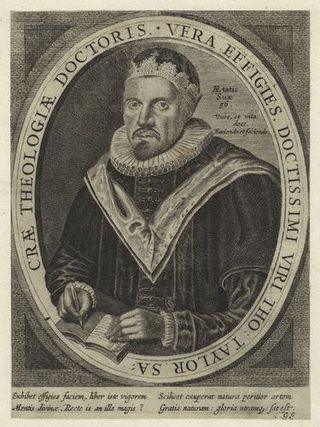Related Research Articles

Jakob Böhme was a German philosopher, Christian mystic, and Lutheran Protestant theologian. He was considered an original thinker by many of his contemporaries within the Lutheran tradition, and his first book, commonly known as Aurora, caused a great scandal. In contemporary English, his name may be spelled Jacob Boehme ; in seventeenth-century England it was also spelled Behmen, approximating the contemporary English pronunciation of the German Böhme.

Francis White was an English bishop and controversialist.
John Floyd was an English Jesuit, known as a controversialist. He is known under the pseudonyms Daniel à Jesu, Hermannus Loemelius, and George White under which he published.

Marco Antonio de Dominis was a Dalmatian ecclesiastic, archbishop of Split and Primate of Dalmatia and all Croatia, adjudged heretic of the Catholic faith, polymath and man of science.

Hendrick de Keyser was a Dutch sculptor, merchant in Belgium bluestone, and architect who was instrumental in establishing a late Renaissance form of Mannerism changing into Baroque. Most of his works appeared in Amsterdam, some elsewhere in the Dutch Republic. He was the father of Pieter and Thomas de Keyser and Willem, and the uncle of Huybert de Keyser, who became his apprentices and all involved in building, decoration and architecture.
Ambrose Corbie, also called Corby or Corbington was an English Jesuit, teacher and author.

Sir John St John, 1st Baronet of Lydiard Tregoze in the English county of Wiltshire, was a Member of Parliament and prominent Royalist during the English Civil War. He was created a baronet on 22 May 1611.
Joseph Creswell was an English Jesuit controversialist.

Samuel Ward (1577–1640) was an English Puritan minister of Ipswich.

Thomas Taylor (1576–1632) was an English cleric. A Calvinist, he held strong anti-Catholic views, and his career in the church had a long hiatus. He also attacked separatists, and wrote copiously, with the help of sympathetic patrons. He created a group of like-minded followers.
John Heigham was an English Roman Catholic printer, writer, and translator. He went into exile in Douai and Saint-Omer, where he married and brought up a family. A son John, who took holy orders, left Rome for the English mission in 1649.
Anthony Batt, was a Benedictine monk.

Count Simon VII of Lippe was a ruler of the Reformed County of Lippe-Detmold.

This is a complete chronological bibliography of Francis Bacon. Many of Bacon's writings were only published after his death in 1626.
William Crashaw or Crashawe (1572–1626) was an English cleric, academic, and poet.

Claus Daa was a Danish admiral, nobleman and landowner. He served as Admiral of the Realm from 1631 and was awarded the Order of the Elephant in 1633.
References
- ↑ "Everat, Thomas (EVRT572T2)". A Cambridge Alumni Database. University of Cambridge.
![]() This article incorporates text from a publication now in the public domain : "Everard, Thomas". Dictionary of National Biography . London: Smith, Elder & Co. 1885–1900.
This article incorporates text from a publication now in the public domain : "Everard, Thomas". Dictionary of National Biography . London: Smith, Elder & Co. 1885–1900.